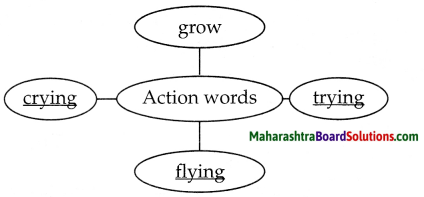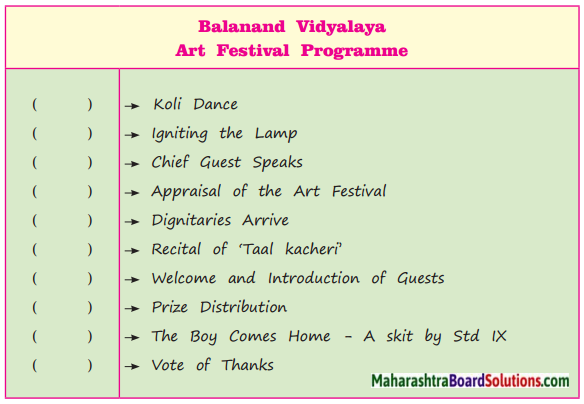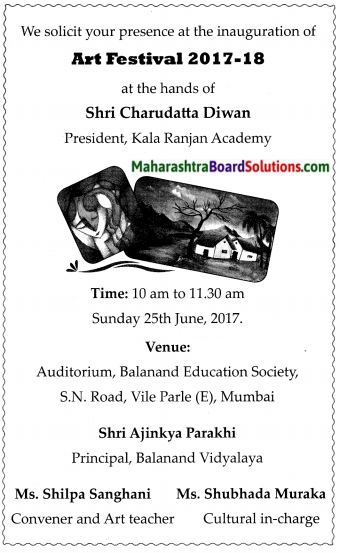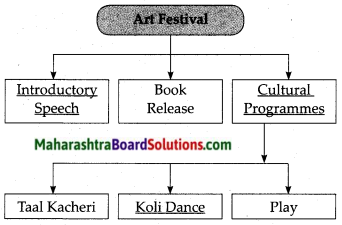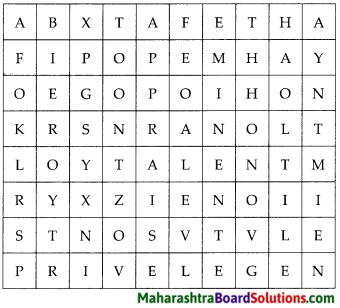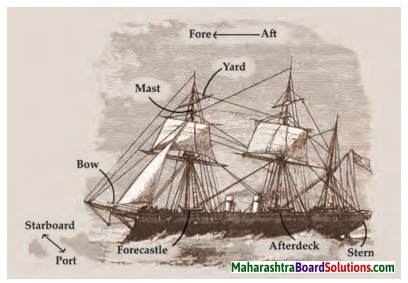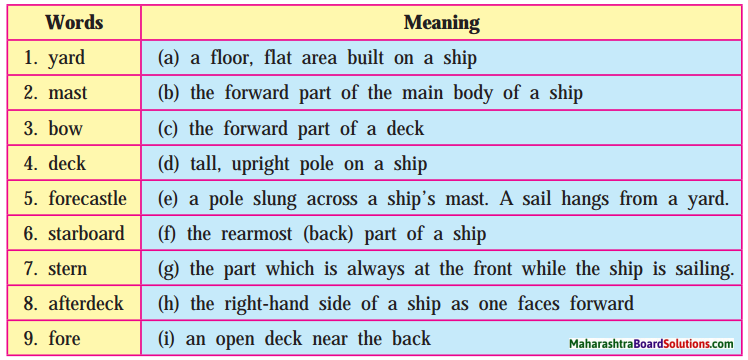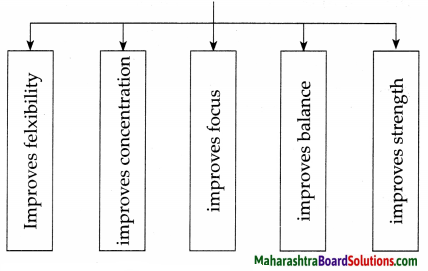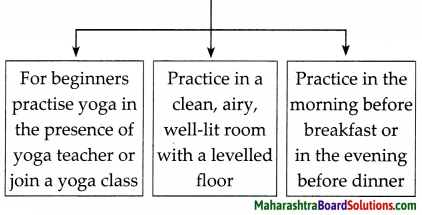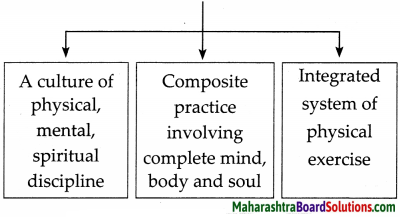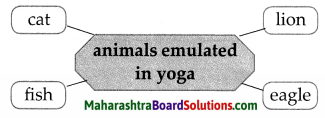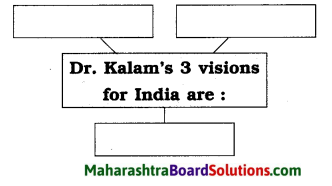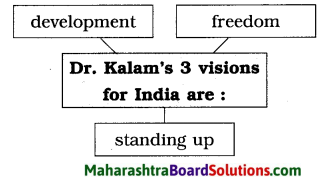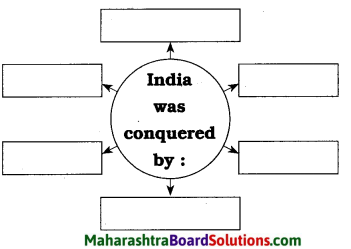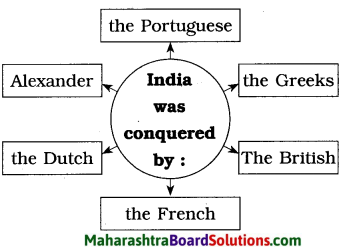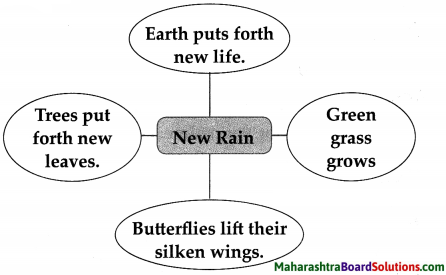Balbharti Maharashtra State Board Class 7 English Solutions Chapter 2.3 Abdul Becomes a Courtier Notes, Textbook Exercise Important Questions and Answers.
Maharashtra State Board Class 7 English Solutions Chapter 2.3 Abdul Becomes a Courtier
Class 7 English Chapter 2.3 Abdul Becomes a Courtier Textbook Questions and Answers
1. From the play, find all the words that are related to the following.
knowledge and learning, books, works
Add other related words you know to the list.
Question 1.
From the play, find all the words that are related to the following.
Add other related words you know to the list.
- knowledge and learning
- books
- works
Answer:
- Student, smart, thirst for knowledge, learned, philosophy, astronomy, arabic, persian, scholar, intellectual, sagacious, astute, university, degree.
- Student, smart, knowledge, learned, scholar, words, e-book.
- Merchant, serve, clerk, pay, office, poultry, keeper, salary, job.
![]()
2. Discuss the following.
(a) Abdul gets what he wants in the end. What is the major factor that contributes to this success?
- His learning of books
- His intelligence
- His attitude
- His relations with other people
- His luck
(b) The Emperor says he had realised earlier that Abdul has great talent. Does this tally with his actions? Give your opinion.
Question a.
Abdul gets what he wants in the end. What is the major factor that contributes to this success?
- His learning of books
- His intelligence
- His attitude
- His relations with other people
- His luck
Answer:
His attitude
![]()
Question b.
The Emperor says he had realised earlier that Abdul has great talent. Does this tally with his actions? Give your opinion.
Answer:
No, it does not. But according to me the Emperor wanted to know whether Abdul could put all his knowledge into practical use.
3. Write a letter from Abdul to the Emperor, requesting the Emperor to give Abdul a suitable job.
Question 1.
Write a letter from Abdul to the Emperor, requesting the Emperor to give Abdul a suitable job.
Answer:
Your Royal Highness,
I, Abdul, am a subject in your kingdom. I have learnt everything books could teach me. I would like to be at your service.
I will serve you with all the knowledge, I have gained, if your royal highness will give me the opportunity. All my knowledge would really be of great use and if given a chance I will do everything I can to the best of my ability. Hoping and awaiting a positive reply. Thanking you in anticipation.
Your loyal subject,
XYZ (Abdul)
![]()
4. Rewrite the play in the form of a story.
Question 1.
Rewrite the play in the form of a story.
Rewrite the play in the form of a story.
Answer:
Abdul, the Achiever
Once upon a time during the reign of Emperor Akbar, there lived a very humble school teacher. He had an equally humble and down to earth son named Abdul. Abdul dreamt of becoming a scholar. His father could not fund him for the books because they were very costly. His father tried to borrow books from the school library but was unsuccessful. Abdul was disheartened.
He hit upon a brilliant idea to solve his problem. He decided to work for the rich, instead of taking money for services, he requested them to allow him to read the books in their stores. Abdul read and read and became a learned scholar that too one in a million. Now that he had completed his education he aspired to work in the Emperor’s office. The Emperor heard of him and was ready to appoint him. He was first put in charge of the Murgikhana.
Abdul was disappointed at first but then decided to put in his best. His efforts paid him well. The hens were healthier than before. The Emperor was surprised that Abdul had not used any money from the treasury. The Emperor was worried that the hens had died but Abdul told the Emperor that all the hens were in the pink of health because he was feeding them with the left-overs from the Emperor’s kitchen, which was free of cost and something the hens enjoyed and that was the secret of their health.
The Emperor was happy and put him in charge of the library. Abdul was unhappy because he aspired to be a courtier. But he took his job too as a challenge and started making changes in the library. A year later when the Emperor entered the library he was shocked to see that all the books had very expensive covering.
He thought that this would have cost a fortune. Abdul clarified the Emperor’s doubt and told him that it has cost nothing because he used the rich, discarded fabrics of the bags in which requests were sent to the Emperor. Abdul said that he had asked the royal tailors to stitch the jackets and covers for the books. The Emperor was so impressed that he immediately appointed Abdul his courtier.
Moral: Waste not, want not.
![]()
5. Suggest at least one method of creating something useful or beautiful from waste.
Question 1.
Suggest at least one method of creating something useful or beautiful from waste.
6. Write how you take care of your books.
Question 1.
Write how you take care of your books.
Answer:
I see to it that my books are always covered, with my name written on it. I do not throw my books anywhere. I keep them neatly whether in my bag or on my table at home. I do not eat or drink anything with my books in front of me so as to avoid spilling and getting oil stains on my books.
7. Language Study: Common nouns – 3: Common nouns can be classified in one more way – concrete nouns and abstract nouns. Concrete nouns stand for things that you can actually touch or see.
Examples : school, house, bags, buttefflies, child.
Abstract nouns stand for ideas, feelings, qualities, actions, states, etc.
Examples: life, time, goodness, progress, kindness, childhood, honesty, mathematics
Can you spot at least three abstract nouns in the following paragraph?
‘We put the plan of action in motion immediately. We kept it a secret. We wanted to give Mrs Desai a surprise. But her intelligence is really appreciable. She spotted the change within a week.’
Now you know that plural forms of nouns have -s, -es, or -ies at the end. But the plurals of some nouns are formed differently. Look at the following forms.
- child – children man – men
- tooth – teeth foot – feet
- leaf – leaves mouse – mice
Some nouns have the singular and the plural alike.
Examples: sheep, deer.
![]()
Class 7 English Chapter 2.3 Abdul Becomes a Courtier Additional Important Questions and Answers
Answer the following questions.
Question 1.
How did Abdul manage to feed the birds well without spending money?
Answer:
Abdul was in charge of the Emperor’s ‘Murgikhana’. He fed the birds with the left-overs from the kitchen, like scraps, shells and kitchen waste, which the hens enjoyed. This diet not only made the hens healthy but was also free of cost.
Question 2.
How did the Emperor reward Abdul for his work? Do you think the Emperor’s action was right?
Answer:
The Emperor rewarded Abdul by making him in charge of the library. Yes, I think the Emperor’s action was right because he wanted to see how well Abdul would handle this task too.
Question 3.
How did Abdul manage to get expensive jackets for the books?
Answer:
Abdul had noticed that all the formal requests that came to the Emperor were in bags made of the best of fabrics which were discarded. He used these discarded silk, velvet and brocade to make beautiful covers and jackets for the books in the library.
![]()
Reading Skills, Vocabulary and Grammar
Read the following passage and do the activities.
Simple Factual Questions:
Question 1.
Complete the sentences.
1. Abdul’s father was a ………… .
2. Abdul wanted his father to lend him
Answer:
1. schoolmaster
2. a little gold
Complex Factual Questions:
Question 1.
How many books could Abdul’s father get for him?
Answer:
Abdul’s father could not get any books for him.
Question 2.
What does Abdul want to do? How does he plan to do it?
Answer:
Abdul wants to acquire knowledge and become a scholar. He plans to buy books and study them to rise high and become famous.
![]()
Question 3.
What are books and manuscripts compared to?
Answer:
Books and manuscripts are compared to treasures rare and exclusive.
Vocabulary:
Question 1.
Frame a sentence with the phrase ‘brighter tomorrow’.
Answer:
Rohan worked day and night for a brighter tomorrow.
Grammar:
Question 1.
How many books could you get? (Identify the kind of sentence)
Answer:
Interrogative.
![]()
Question 2.
Pick out a word from the extract which means – to hope or to dream.
Answer:
aspire.
Question 3.
Guess the meaning of ‘a brighter tomorrow’ in context of the play.
Answer:
A brighter tomorrow means a better or brighter future.
Personal Response:
Question 1.
Do you like to read books? Why?
Answer:
Yes, I like to read books. I like to read books because it helps to increase our knowledge, gives us a lot of information and keeps us occupied when there is nothing to do. For me. books are my best friends.
![]()
Question 2.
Abdul got the Royal Tailors to work for making the jackets. What skills does it reflect?
Answer:
The skill which comes out is making best from waste. It not only saves money but also helps to save the environment.
Read the following passage and do the activities.
Simple Factual Questions:
Question 1.
Complete the sentences.
- You appear to be smart,
- Quench my
- I am pleased with you
- made a poultry people?
Answer:
- be my clerk
- thirst for knowledge
- work and loving care!
- Intellectual, sagacious, astute
![]()
Complex Factual Questions:
Question 1.
What request must Abdul have sent to the Emperor?
Answer:
Abdul must have requested the Emperor to give him a position in his court because he had gained all the knowledge which would help him in the job.
Question 2.
What was the merchant’s reaction to Abdul’s work?
Answer:
The merchant was very pleased with Abdul’s work and wanted to reward him.
![]()
Question 3.
What job did the emperor give Abdul?
Answer:
The Emperor made Abdul his poultry keeper, in charge of the Royal Murgikhana.
Vocabulary:
Question 1.
Find words/phrases meaning ‘rare’.
Answer:
One in a million; a gem; unique
Question 2.
Guess the meaning of ‘a gem’ in the context of this play.
Answer:
The context ‘a gem’ in the play means someone very precious, of great value.
Question 3.
Find pairs of rhyming words used in this passage.
Answer:
- serve – deserve
- clerk – work
- care – rare – fair
- store – more
- learned – yearned
- notice – office
- prayer – care
- scholar – keeper
- refuse – use
- Persian – million.
![]()
Grammar:
Question 1.
Write the noun forms of:
- move
- direct
- explore
- determine
- estitute
- hesitate
- compel
- treat
Answer:
- movement
- direction
- exploration
- determination
- destitution
- hesitation
- compulsion
- treatment
Language Study
Do as directed.
Question 1.
Can you spot at least three abstract nouns in the following paragraph?
‘We put the plan of action in motion immediately. We kept it a secret. We wanted to give Mrs Desai a surprise. But her intelligence is really appreciable. She spotted the change within a week.
Answer:
secret, surprise, intelligence.
![]()
Question 2.
Now you know that plural forms of nouns have -s, -es or -ies at the end. But the plurals of some nouns are formed differently. Singular :
- woman
- person
- goose
- half
- wife
- potato
- cactus
- fungus
- oasis
- syllabus
- datum
- focus
- louse
Answer:
Plural:
- women
- persons /people
- geese
- halves
- wives
- potatoes
- cacti
- fungi
- oases
- syllabi/syllabuses
- data
- foci
- lice
![]()
Question 3.
More of nouns having singular and plural alike.
Singular :
- news
- aircraft
- species
- darts
- pants
- trousers
- jeans
- glasses
- scissors
- fish
- salmon
- headquarters
- Chinese
Answer:
Plural:
- news
- aircraft
- species
- darts
- pants
- trousers
- jeans
- glasses
- scissors
- fish (if it is the same species)
- salmon
- headquarters
- Chinese
Question 4.
I’m happy to announce, now you are my courtier! (Kind of sentence)
Answer:
Exclamatory sentence.
![]()
Question 5.
The Royal tailors made the jackets. (Change the voice)
Answer:
The jackets were made by the Royal tailors.
Question 6.
Abdul enters and bows before the Emperor. (Pick out the conjunction and state its kind)
Answer:
and – coordinating conjunction.
Question 7.
Days passed by, he learned and learned. (Identify the figure of speech and explain)
Answer:
Repetition: The word ‘learned’ has been repeated for better poetic effect.
Question 8.
I need nothing more. (Identify the figure of speech and explain)
Answer:
Alliteration: The sound of the letter ‘n’ has been repeated for better poetic effect.
Abdul Becomes a Courtier Summary in English
The story in this lesson revolves around Abdul who is very wise and intelligent and loves reading and learning. His father cannot afford the costly books and so Abdul works and accepts his reward only in kind and that too he asks for nothing more than reading books. He quenches his thirst for knowledge and desires to work in the Emperor’s office. Let us see how he gets this honourable position.
Introduction:
The lesson ‘Abdul Becomes a Courtier’ is taken from the series of Akbar and Birbal stories. It has been adapted into the dialogue form by Pratibha Nath who is a wonderful story teller and weaves stories for children.
![]()
Glossary:
- erudition (n) – learning, scholarly work
- scores (n)- sets of twenty
- clerk (n) – a person who keeps records, accounts, etc.
- quench (v) – to satisfy
- office (n) – position, responsibility
- prayer (n) (here) – request
- sagacious (adj) – wise
- astute (adj) – intelligent, one who knows how to use a situation to his advantage
- zeal (n) – enthusiasm
- drive (n) – an effort made to achieve a certain purpose
- brains (n) – intelligence
- shirk (y) – avoid
- brocade (n) – rich fabric woven with golden or silver thread
- papers (n) – official documents
- aspire (y) – to hope or dream
- manuscripts (n) – written by hand, handwritten
- rare (adj) – uncommon, unique
- exclusive (adj) – of high quality
- dejected (adj) – sad
- rejected (adj) – not accepted
- yearned (v) – to long for
- conviction (n) – firm belief
- passion (n) – love
- relish (v) – enjoy
- thrive (v) – grow
- perseverance (n) – continuing to do something regardless of failure
- chores (n) – work
- poultry keeper (n) – a person who looks after chickens, ducks and other birds that are kept for their egg and meat.
- ration (n) (here) – food.
- jacket (n) – outer covering.
- discarded (v) – disposed off, thrown away.
- courtier (n) – a person who attends a royal court as an adviser to the king or queen.
- expensive (adj) – costly.
- ponders (v) – thinks deeply.
